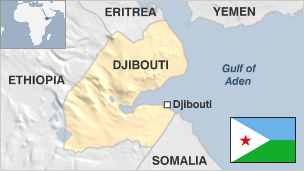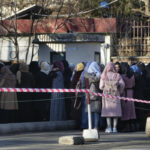
Lying on the Bab el-Mandeb Strait, the tiny African nation of Djibouti serves as a gateway to the Suez Canal, one of the world’s busiest shipping routes.
Its port is the lifeblood of its economy, providing the biggest source of income and employment in this otherwise barren country.
Djibouti’s proximity to restive areas in Africa and the Middle East and its relative stability have made it a prized location for foreign military bases and ensured a steady flow of foreign assistance.
Former colonial power France maintains a significant military presence. The country also hosts America’s largest military base in Africa, China’s first overseas military base and Japan’s first military base since the Second World War.
Djibouti serves as the main gateway for trade for its giant neighbour, landlocked Ethiopia.
-
Capital: Djibouti
-
Area: 23,200 sq km
-
Population: 957,200
-
Languages: Arabic, French, Somali, Afar
-
Life expectancy: 65 years (men) 69 years (women)
President: Ismail Omar Guelleh


Ismail Omar Guelleh came to power in elections in 1999, succeeding Hassan Gouled Aptidon, who led the country for two decades since independence.
He was re-elected in 2005, 2011, 2016 and 2021 in elections that were largely boycotted by the opposition amid complaints over widespread irregularities
Born in Ethiopia in 1947, Mr Guelleh, like his predecessor, belongs to the Mamassans, a sub-clan of the Issa. His family moved to Djibouti in 1960 and eight years later he joined the intelligence services, rising through the ranks to become head of state security in 1977.


Djibouti’s media environment is dominated by the state. There are no private TV or radio stations and the government owns the main newspaper and the national broadcaster Radiodiffusion-Television de Djibouti (RTD).
Reporters Without Borders says local journalists “live in fear”. The few opposition media outlets are based outside the country.
Some key dates in Djibouti’s history:


825 – Somali and Afar ethnic groups become first Africans to embrace Islam in the region.
1862 – France gains a foothold in the region, acquiring the trading port of Obock.
1888 – French colony of Somaliland established over the region.
1946 – Djibouti made an overseas territory within the French Union with its own legislature and representation in the French parliament.
1977 – Independence from France, renamed Republic of Djibouti. France retains a significant military base in Djibouti after independence.
1991-2000 – Civil war: Ends with a power-sharing agreement between Afar rebels and the Somali Issa-dominated government.
2003 – First free multi-party presidential election.
2017 – China formally opens its first overseas military base in Djibouti.






